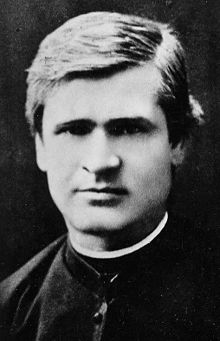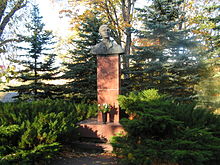Antanas Baranauskas
Antanas Baranauskas ( Latin Antonius Baranovski , Polish Antoni Baranowski ; born January 17, 1835 in Anykščiai , † November 26, 1902 in Anykščiai) was a Lithuanian poet , and from 1897 Bishop of Sejny . He used the pseudonyms Bangputys , Jurksztas Smalaūsis , Jurkštas , Smalaūsis and Baronas .
youth
Baranauskas grew up in the country in modest material circumstances. Early in his youth, his parents sent him to a local church school. In his diary he described that he learned Polish there between 1841 and 1843, and later, between 1848 and 1851, Russian as well .
His first attempts at writing poetry and rhymes in Lithuanian were found in his diaries. Later he attended a secondary school in Rumšiškės . During this time he wrote his first poems in Polish.
Writer in Lithuanian and Polish

In 1853 he finished school and worked as a writer in various cities. It was at this time that he met the Lithuanian poet Karolina Praniauskaitė (Polish: Karolina Proniewska ), a famous Dutch writer, with whom he shared a passion for the poetry of Adam Mickiewicz . Praniauskaitė suggested that Baranauskas write more in Lithuanian.
1856 tried the family Karolina to separate the pair by entering Baranauskas' in the seminary in Varniai promoted (which is now the Vytautas Magnus University Kaunas belongs). While studying there, he focused on the development of the written Lithuanian books and wrote a commentary in Lithuanian and Schemeitic "Apie lietuvių ir žemaičių kalbą". This was the first attempt to distinguish these two Lithuanian dialects.
During his time as a seminarian, Baranauskas began writing poetry in Lithuanian. An early work written under the influence of Mickiewicz was Anykščių šilelis (The Anykščiai Grove), in which he lamented the deforestation of the Anykščiai forest by foreign masters. Literary critics consider it a symbolic reference to Lithuanian books. It is said that Baranauskas wrote the poem in anger because its editor Alexander Gabszewicz had said the Lithuanian language was not beautiful enough to write poetry, although historians debate whether it is more of a myth. The poem Laurynas Ivinskis was the first in 1861 and again in 1862 Laurynas Ivinskis' published calendars.
He completed his studies at the Spiritual Academy of St. Petersburg from 1858 to 1862 with a master's degree in theology . He was ordained a priest on March 24, 1862 . Between 1863 and 1864 he studied at Catholic faculties in Munich , Rome , Innsbruck and Leuven .
In 1871 he worked at the seminary in Kaunas and began teaching the Lithuanian language. He wrote a grammar textbook in Lithuanian. After Baranauskas went to Sejny , he gained a considerable reputation for being able to preach in both Polish and Lithuanian. He described himself as "gente Lithuanus, natione Polonus" ( born Lithuanian, nationality after Poles ).
When, after 1880, he found that despite all the promises made by the Tsarist authorities, the ban on printing books in Lithuanian had not been lifted, he concentrated on translating the Bible into Lithuanian.
On March 24, 1884 Baranauskas was appointed titular bishop of Thespiae and auxiliary bishop in Žemaitija . The bishop of Lutsk , Szymon Marcin Kozłowski , gave him episcopal consecration on June 24th of the same year; Co-consecrators were Anton Johann Zerr , auxiliary bishop in Tiraspol , and Cyril Lubowidzki , auxiliary bishop in Lutsk.
On August 2, 1897, Pope Leo XIII appointed him . to the Bishop of Sejny .
After he died in Anykščiai on November 26, 1902, a memorial to him was erected in Sejny .
On January 16, 2014, the asteroid (169568) Baranauskas was named after him.
legacy
Before Baranauskas, only Russian and Polish were considered cultural languages, while Lithuanian was considered backward and rural. Baranauskas was one of the first to use Lithuanian as a literary language, and thus contributed significantly to the equality of the Lithuanian language and culture.
Web links
- Entry on Anton Baranowski on catholic-hierarchy.org ; Retrieved July 9, 2017.
- Literature by and about Antanas Baranauskas in the catalog of the German National Library
Individual evidence
- ↑ a b Various authors: Antoni Baranowski . In: Małgorzata Pawłowska (ed.): Biography Suwalskie ( Polish ). Jaćwież, Suwałki 1993 (accessed July 17, 2006).
- ^ A b Egidijus Aleksandravičius: Giesmininko kelias ( Lithuanian ). Versus Aureus, Vilnius 2003 (Retrieved July 18, 2006).
- ↑ Danutė Mukienė: Žemaitijos rašytojai ( lt ) May 15, 2003. Archived from the original on February 7, 2012. Retrieved on April 18, 2007.
- ↑ Krystyna Syrnicka: Karolina Proniewska - zapomniana poetka ze Żmudzi Archived from the original on July 3, 2007. In: Nasz Czas . 20, No. 559, May 2002, p. 25. ISSN 1641-7933 . “Dla historii literatury litewskiej najbardziej znaczący jest wysoko oceniony przez literaturoznawców jej przekład legendy o Egle, królowej węży z Witoloraudy JIKraszewskiego. "Ţalčiř motë" ("Matka węży") była zamieszczona w kalendarzu L. Iwińskiego (L. Ivinskisa) from 1859 rok. "
- ↑ Krystyna Syrnicka: Karolina Proniewska - zapomniana poetka ze Żmudzi Archived from the original on July 3, 2007. In: Nasz Czas . 20, No. 559, May 2002, p. 25. ISSN 1641-7933 .
- ↑ Krystyna Syrnicka: Karolina Proniewska - zapomniana poetka ze Żmudzi Archived from the original on July 3, 2007. In: Nasz Czas . 20, No. 559, May 2002, p. 25. ISSN 1641-7933 . "To Proniewska skłoniła Baranowskiego do pisania wierszy po litewsku -" budzić uczucia ojczystym dźwiękiem "(It was Proniewska who did encouraged Barnauskas write poetry in Lithuanian -" to wake feelings whit fathers (language) sound ")"
- ↑ Justinas Marcinkevičius: Stai kas yra mes . In: Tekančios upės vienybė ( Lithuanian ). Santara, Kaunas 1995, pp. 42-44 (accessed July 18, 2006).
| personal data | |
|---|---|
| SURNAME | Baranauskas, Antanas |
| ALTERNATIVE NAMES | Baranovski, Antonius (Latin); Baranowski, Antoni (Polish); Bangputys (pseudonym); Smalaūsis, Jurksztas (pseudonym); Jurkštas (pseudonym); Smalaūsis (pseudonym); Baronas (pseudonym) |
| BRIEF DESCRIPTION | Lithuanian poet, mathematician and bishop |
| DATE OF BIRTH | January 17, 1835 |
| PLACE OF BIRTH | Anykščiai |
| DATE OF DEATH | November 26, 1902 |
| Place of death | Anykščiai |

